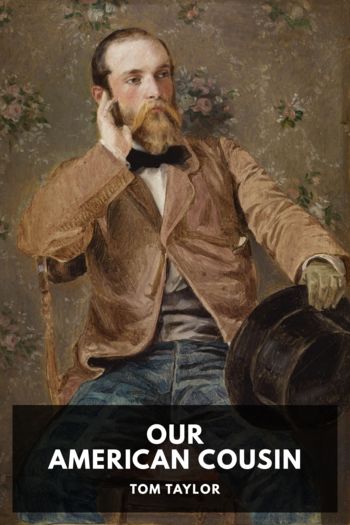Struggles and Triumphs, P. T. Barnum [good books to read in english .txt] 📗

- Author: P. T. Barnum
Book online «Struggles and Triumphs, P. T. Barnum [good books to read in english .txt] 📗». Author P. T. Barnum
In the same year, I bought out the Aquarial Gardens in Boston, and soon after removed the collection to the Museum. I had now the finest assemblage of fresh as well as salt water fish ever exhibited, and with a standing offer of one hundred dollars for every living brook-trout, weighing four pounds or more, which might be brought to me, I soon had three or four of these beauties, which trout-fishermen from all parts of the country came to New York to see. But the trout department of my Museum required so much care, and was attended with such constant risks, that I finally gave it up.
In December, 1861, I made one of my most “palpable hits.” I was visited at the Museum by a most remarkable dwarf, who was a sharp, intelligent little fellow, with a deal of drollery and wit. He had a splendid head, was perfectly formed, was very attractive, and, in short, for a “showman,” he was a perfect treasure. His name, he told me, was George Washington Morrison Nutt, and his father was Major Rodnia Nutt, a substantial farmer, of Manchester, New Hampshire. I was not long in despatching an efficient agent to Manchester, and in overcoming the competition with other showmen who were equally eager to secure this extraordinary pigmy. The terms upon which I engaged him for three years were so large that he was christened the $30,000 Nutt; I, in the meantime, conferring upon him the title of Commodore. As soon as I engaged him, placards, posters and the columns of the newspapers proclaimed the presence of “Commodore Nutt,” at the Museum. I also procured for the Commodore a pair of Shetland ponies, miniature coachman and footman, in livery, gold-mounted harness and an elegant little carriage, which, when closed, represented a gigantic English walnut. The little Commodore attracted great attention and grew rapidly in public favor. General Tom Thumb was then travelling in the South and West. For some years he had not been exhibited in New York, and during these years he had increased considerably in rotundity and had changed much in his general appearance. It was a singular fact, however, that Commodore Nutt was almost a facsimile of General Tom Thumb, as he looked half-a-dozen years before. Consequently, very many of my patrons, not making allowance for the time which had elapsed since they had last seen the General, declared that I was trying to play “Mrs. Gamp” with my “Mrs. Harris”; that there was, in fact, no such person as “Commodore Nutt”; and that I was exhibiting my old friend Tom Thumb under a new name. The mistake was very natural, and to me it was very laughable, for the more I tried to convince people of their error, the more they winked and looked wise, and said, “It’s pretty well done, but you can’t take me in.”
Commodore Nutt enjoyed the joke very much. He would sometimes half admit the deception, simply to add to the bewilderment of the doubting portion of my visitors. After he had been in the Museum a few weeks, I took the Commodore to Bridgeport to spend a couple of days by way of relaxation. Many of the citizens of Bridgeport, who had known Tom Thumb from his birth, would salute the Commodore as the General Tom Thumb. The little fellow would return these salutes, for he delighted in keeping up the illusion.
Going into a crowded barbershop one morning with the little Commodore, we met my friend Mr. Gideon Thompson, who was sitting there, and who called out:
“Good morning, Charley; how are you? When did you get home?”
“I’m quite well, thank you, and I arrived last night,” responded the Commodore, with due gravity.
“I’ve got a horse now that will beat yours,” said Mr. Thompson.
“He must be pretty fast, then.”
“Well, Charley, I’ll drive out by your mother’s the first fine day, and give you a trial.”
“All right,” said little Nutt, “but you had better not wager too much on your fast horse, for you know mine is some pumpkins.”
“Well, Uncle Gid.,” I exclaimed, “you are had this time; this little gentleman is not General Tom Thumb, but Commodore Nutt.”
“What!” roared friend Gid.; “do you think I am an infernal fool? Why, I knew Charley Stratton years before you ever saw him, didn’t I, General?”
No one in the room suspected that my little friend was any other than General Tom Thumb, till Mr. William Bassett, the General’s brother-in-law, came in and remarked the “wonderful resemblance to our little Charley, as he looked years ago.”
“Is not this the General?” inquired half a dozen astonished men, who were speedily assured he was not, but was quite another person. This gave rise to a proposition to exhibit the Commodore to the General’s mother, and a coach was procured, and Mr. Bassett, the Commodore, and I went to Mrs. Stratton’s house. When we arrived, the Commodore shouted out:
“How are you, mother?”
But the mother, of all persons in Bridgeport, was not to be deceived, though she expressed her astonishment at the very striking likeness the Commodore bore to her son as he once





Comments (0)